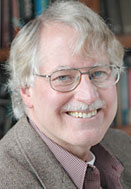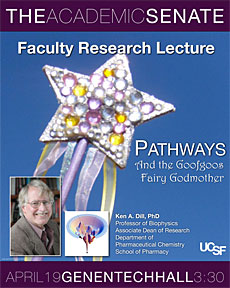53rd Annual Faculty Research Lecture in Basic Science
Awarded to Ken A. Dill, PhD
The Academic Senate is pleased to announce the selection of Ken A. Dill, PhD, as the recipient of the 53rd Faculty Research Lectureship. Dr. Dill has advanced the understanding of the physical properties of proteins, and in particular, helped to explain the folding code, the folding problem, addressed protein stability, and protein sequence space. His research findings in these areas have impacted biomedical science in far-reaching ways.
Lecture Title: Pathways And the Goofgoos Fairy Godmother
Date/Location: Monday, April 19, 2010 at 3:30 pm in Genentech Hall at the Mission Bay Campus

The protein folding problem questions the physical mechanism by which proteins adopt their native structures. Ken Dill's research led to a "zipping and assembly mechanism" which resolved this question and resulted in the first physics-based way to predict protein native structures from amino acid sequences. Recently Science (RF Service, 321, 786 (2008)) declared this problem now nearly solved and described Professor Dill's key role in it.
In 1985, Ken Dill developed the HP protein model which demonstrated a dominant force of folding, a contrast to earlier views. To date, more than fifty research groups have published on the HP model and his "Dominant Forces of Protein Folding" has more than 1900 citations. This new understanding of the folding code opened the idea of creating foldamers, non-biological molecules that could fold up to have protein-like sequence-structure-function relationships. One such class, called peptoids, is now an active field of research at UCSF and other universities. Some peptoid foldamers research is moving toward clinical trails as lung surfactant mimics, surgical glues for tissue engineering--a new class of antimicrobials--which have been shown to halt the development of MS in mice, and as potential optical materials. Finally, Dr. Dill was the first to explore a protein's entropy, and described them as funnel-shaped energy landscapes, sometimes referred to as the new view of protein folding. This funnel idea is now ubiquitous and used throughout biochemistry textbooks.

Dr. Dill received a S.B. and S.M. from Massachusetts Institute of Technology, a PhD at University of California, San Diego, and then did postdoctoral work at Stanford University. He has been a professor of chemistry and pharmaceutical chemistry at University of Florida, Gainesville, University of Utah, and at University of California, San Francisco, where he became a full Professor, Pharmaceutical Chemistry, Biochem/Biophysics, Biopharmaceutics in 1989. In 2001, he also became the Associate Dean, Research, at the UCSF School of Pharmacy. He also serves as a faculty affiliate in the California Institute for Quantitative Biosciences, headquartered on the UCSF Mission Bay campus. The many honors and awards that Dr. Dill has received include election to the National Academy of Sciences (2008); Distinguished Service Award, Biophysical Society (2007); the Hans Neurath Award (Protein Society, 1998); and elected as a Fellow, AAAS (1997). In addition, he currently serves on the editorial/advisory boards of, among others, Ann Rev Biophys & Biomol Structure, Protein Engineering, Physical Biology, and Multiscale Modeling & Simulation. His textbook, Molecular Driving Forces, is used in more than 100 graduate and undergraduate courses.
A reception will follow.
